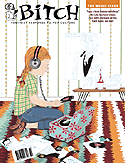| |

|
|
Bitch:
Feminist Response to Pop Culture
When
people use the phrase "bad body image," it's often
assumed this refers to anorexia and bulimia, conditions endemic
to white and middle-class female teens and traced to the media
and cultural notions of propriety, self-control, and success.
Adios, Barbie editor Ophira Edut, co-founder of HUES magazine,
has put together a collection of young voices that aims to
step back from the vanillafied idea that bad body image means
skipping dessert and logging obsessive hours on the StairMaster.
These twenty-five essays go far beyond "I hate my butt
and I'm gonna tell you why" to bring body image into
multiple and overlapping realms of family, race, school, and
sexuality.
Here,
body image extends to the idea of remaining a virgin until
marriage, which, as Keesa Schreane explains in "Appraising
God's Property," means being made to feel selfish or
foolish or overly proud. In "Intimate Enemies,"
Jennifer Berger describes the experience of living with a
series of elaborate and dangerous food allergies and the queasy
irony of hearing women tell her they'd switch places with
her if it meant being so thin. Mira Jaccob, the author of
"My Brown Face," recalls her younger self asking
her Indian mother "Why don't you ever smile when people
tell you you're pretty?" and growing up to realize that,
when faced with men who saw in her face only an exotic country
to try and "colonize," she's just as closed. And
in "My Jewish Nose," our own Lisa Miya-Jerivs explores
the implications of the fact that legions of assimilated girls
are urged to lop off the most visible reminder of their heritage--not
by makeup ads, but by their mothers and grandmothers.
If you want an answer to the question of why women bond over
hatred of their bellies, skin, and hair in front of other
women but never quite connect the same way over loving those
things, you won't necessarily find it here--if Adios, Barbie
makes one thing clear, it's that understanding the many ways
in which we're defined, discounted, and distringuished by
ourselves and others is never a done deal. Many of the essays
read with a palpable sense of struggle and reticence, illustrating
the ingrained reluctance to be the one chick in the locker
room smiling instead of frowning at her reflection in the
mirror--but it's this girl-taboo that the writers strive to
break with no apologies. (Erin J. Aubry does it particularly
succintly in "The Butt: Its Politics, Its Profanity,
Its Power" when she concludes "I don't have an issue.
I have a groove thing.")
And
while that lean, mean, plastic she-devil is invoked more than
once--most enjoyably in Susan Jane Gilman's now-classic "Klaus
Barbie, and Other Dolls I'd Like to See"--Adios, Barbie
goes a long way toward pointing out that, though the media
is plenty powerful in conspiring to separate girls and their
bodies, our own reconceptualization of ourselves can be just
as potent. (Andi Zeisler)
|
|
